The AMD Zen and Ryzen 7 Review: A Deep Dive on 1800X, 1700X and 1700
by Ian Cutress on March 2, 2017 9:00 AM ESTBenchmarking Performance: CPU Web Tests
One of the issues when running web-based tests is the nature of modern browsers to automatically install updates. This means any sustained period of benchmarking will invariably fall foul of the 'it's updated beyond the state of comparison' rule, especially when browsers will update if you give them half a second to think about it. Despite this, we were able to find a series of commands to create an un-updatable version of Chrome 56 for our 2017 test suite. While this means we might not be on the bleeding edge of the latest browser, it makes the scores between CPUs comparable.
SunSpider 1.0.2 [link]
The oldest web-based benchmark in this portion of our test is SunSpider. This is a very basic javascript algorithm tool, and ends up being more a measure of IPC and latency than anything else, with most high performance CPUs scoring around about the same. The basic test is looped 10 times and the average taken. We run the basic test 4 times.
Mozilla Kraken 1.1 [link]
Kraken is another Javascript based benchmark, using the same test harness as SunSpider, but focusing on more stringent real-world use cases and libraries, such as audio processing and image filters. Again, the basic test is looped ten times, and we run the basic test four times.
Google Octane 2.0 [link]
Along with Mozilla, as Google is a major browser developer, having peak JS performance is typically a critical asset when comparing against the other OS developers. In the same way that SunSpider is a very early JS benchmark, and Kraken is a bit newer, Octane aims to be more relevant to real workloads, especially in power constrained devices such as smartphones and tablets.
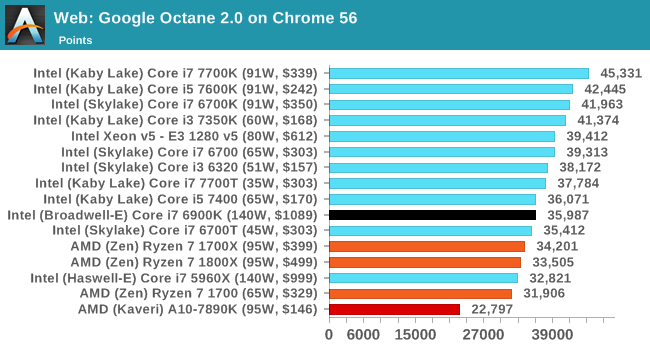
WebXPRT 2013 and 2015 [link]
While the previous three benchmarks do calculations in the background and represent a score, WebXPRT is designed to be a better interpretation of visual workloads that a professional user might have, such as browser based applications, graphing, image editing, sort/analysis, scientific analysis and financial tools. Web2013 is the older tool, superceded by Web2015, however both still are highly relevant for high-performance web applications today.
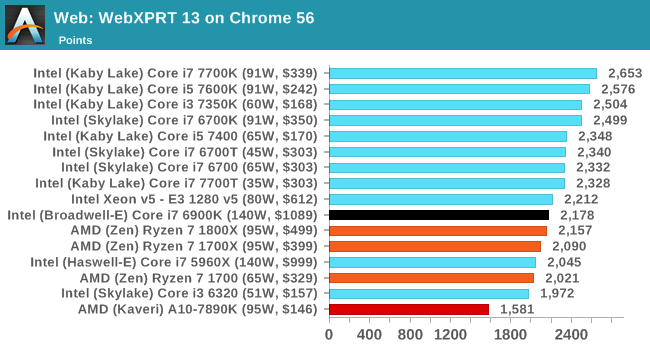
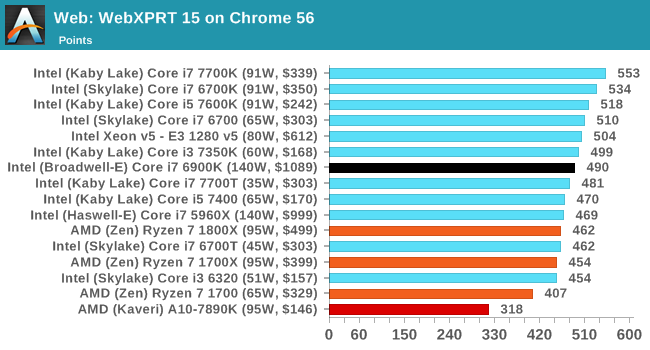


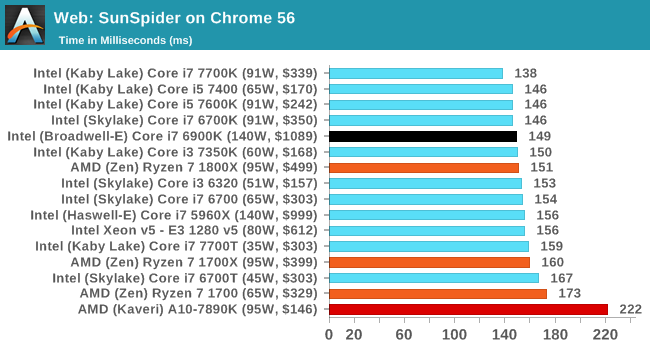
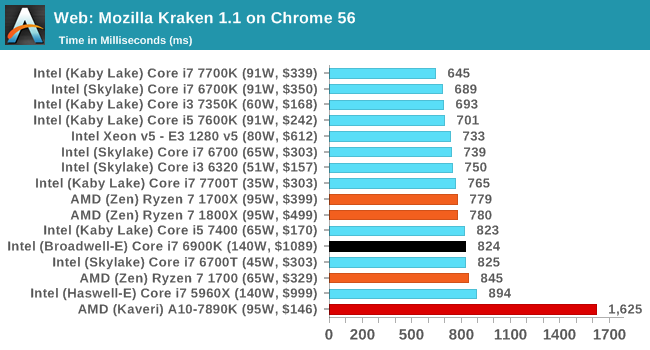








574 Comments
View All Comments
Notmyusualid - Saturday, March 4, 2017 - link
Can't disagree with you pal. They look like they execptional value for money.I on the other hand, am already on LGA2011-v3 platform, so I won't be changing, but the main point here is - AMD are back. And we welcome them too.
Alexvrb - Saturday, March 4, 2017 - link
Yeah... if the pricing is as good as rumored for the Ryzen 5, I may pick up a quad-core model. Gives me an upgrade path too, maybe a Ryzen+ hexa or octa-core down the road. For budget builds that Ryzen 3 non-SMT quad-core is going to be hard to argue with though.wut - Sunday, March 5, 2017 - link
You're really optimistically assuming things.Kaby Lake Core i5 7400 $170
Ryzen 5 1600X $259
...and single thread benchmark shows Core i5 to be firmly ahead, just as Core i7 is. The story doesn't seem to change much in the mid range.
Meteor2 - Tuesday, March 7, 2017 - link
@wut spot-on. It also seems that Zen on GloFlo 14 nm doesn't clock higher than 4.0 GHz. Zen has lower IPC and lower actual clocks than Intel KBL.Whichever way you cut it, however many cores in a chip are being considered, in terms of performance, Intel leads. Intel's pricing on >4 core parts is stupid and AMD gives them worthy price competition here. But at 4C and below, Intel still leads. AMD isn't price-competitive here either. No wonder Intel haven't responded to Zen. A small clock bump with Coffee Lake and a slow move to 10 nm starting with Cannon Lake for mobile CPUs (alongside or behind the introduction of 10 nm 'datacentre' chips) is all they need to do over the next year.
After all, if Intel used the same logic as TSMC and GloFlo in naming their process nodes, i.e. using the equivalent nanometre number of if finFETs weren't being used, Intel would say they're on a 10 nm process. They have a clear lead over GloFlo and thus anything AMD can do.
Cooe - Sunday, February 28, 2021 - link
I'm here from the future to tell you that you were wrong about literally everything though. AMD is kicking Intel's ass up and down the block with no end in sight.Cooe - Sunday, February 28, 2021 - link
Hahahaha. I really fucking hope nobody actually took your "buying advice". The 6-core/12-thread Ryzen 5 1600 was about as fast at 1080p gaming as the 4c/4t i5-7400 ON RELEASE in 2017, and nowadays with modern games/engines it's like TWICE AS FAST.deltaFx2 - Saturday, March 4, 2017 - link
I think the reviewer you're quoting is Gamers Nexus. He doesn't come across as being a particularly erudite person on matters of computer architecture. He throws a bunch of tests at it, and then spews a few untutored opinions, which may or may not be true. Tom's hardware does a lot of the same thing, and more, and their opinions are far more nuanced. Although they too could have tried to use an AMD graphics card to see if the problems persist there as well, but perhaps time was the constraint.There's the other question of whether running the most expensive GPU at 1080p is representative of real-world performance. Gaming, after all, is visual and largely subjective. Will you notice a drop of (say) 10 FPS at 150 FPS? How do you measure goodness of output? Let's contrive something.
All CPUs have bottlenecks, including Intel. The cases where AMD does better than Intel are where AMD doesn't have the bottlenecks Intel has, but nobody has noticed it before because there wasn't anything else to stack up against it. The question that needs to be answered in the following weeks and months is, are AMD's bottlenecks fixable with (say) a compiler tweak or library change? I'd expect much of it is, but lets see. There was a comment on some forum (can't remember) that said that back when Athlon64 (K8) came out, the gaming community was certain that it was terrible for gaming, and Netburst was the way to go. That opinion changed pretty quickly.
Notmyusualid - Saturday, March 4, 2017 - link
Gamers Nexus seem 'OK' to me. I don't know the site like I do Anandtech, but since Anand missed out the games....I am forced to make my opinions elsewhere. And funny you mentions Toms, they seem to back it up to some degree too, and I know these two sites are cross-owned.
But still, when Anand get around to benching games with Ryzen, only then will I draw my final conclusions.
deltaFx2 - Sunday, March 5, 2017 - link
@ Notmyusualid: I'm sure Gamers Nexus numbers are reasonable. I think they and Tom's (and other reviewers) see a valid bottleneck that I can only guess is software optimization related. The issue with GN was the bizarre and uninformed editorializing. Comments like, the workloads that AMD does well at are not important because they can be accelerated on GPU (not true, but if true, why on earth did GN use it in the first place?). There are other cases where he drops i5s from evaluation for "methodological reasons" but then says R7 == i5. Even based on the tests he ran, this is not true. Anyway, the reddit link goes over this in far more detail than I could (or would).Meteor2 - Tuesday, March 7, 2017 - link
@DeltaFX2 in what way was GamersNexus conclusion that tasks that can be pushed to GPUs should be incorrect? Are you saying Premiere and Blender can't be used on GPUs?GN's conclusion was:
"If you’re doing something truly software accelerated and cannot push to the GPU, then AMD is better at the price versus its Intel competition. AMD has done well with its 1800X strictly in this regard. You’ll just have to determine if you ever use software rendering, considering the workhorse that a modern GPU is when OpenCL/CUDA are present. If you know specific in stances where CPU acceleration is beneficial to your workflow or pipeline, consider the 1800X."
I think that's very fair and a very good summary of Ryzen.